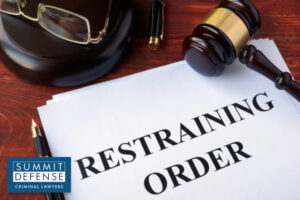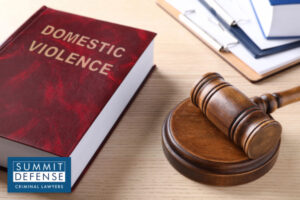What Happens Immediately After a Domestic Violence Arrest?
After a police arrest for domestic violence, one of the first things that may happen is the issuance of a protective order, which can prevent you from returning to your home. Law enforcement may also set certain conditions for your release, and a no-contact order may be placed against you.
This order typically restricts you from having any form of communication with the alleged victim, including living together or even contacting them via phone or social media.
Protective Orders and Their Impact on Living Arrangements
 In domestic violence cases, protective orders can greatly affect your living arrangements, particularly if you live with the alleged victim. These orders are issued to protect the alleged victim from further harm, but they can also result in you being temporarily removed from your home.
In domestic violence cases, protective orders can greatly affect your living arrangements, particularly if you live with the alleged victim. These orders are issued to protect the alleged victim from further harm, but they can also result in you being temporarily removed from your home.
Emergency Protective Orders (EPOs)
An emergency protective order (EPO) can be issued by law enforcement officers at the scene of a domestic violence incident. EPOs typically last for a short period, often 5 to 7 days, but they can immediately restrict you from entering your home or having contact with the alleged victim.
An emergency protective order is usually temporary until a court hearing is held to determine whether further restrictions are necessary.
Temporary Restraining Orders (TROs)
A temporary restraining order (TRO) is commonly issued after an EPO and can last up to 20 to 25 days until the court hearing. This order can prohibit you from returning to your home, especially if the alleged victim is living there. During this time, you may also be ordered to surrender any firearms or other weapons.
Criminal Protective Orders (CPOs)
A criminal protective order (CPO) is issued by the court during a criminal case and can last longer than an EPO or TRO, sometimes lasting the length of the case or until the court decides otherwise.
Criminal protective orders can prevent you from living in your home or having contact with the alleged victim, even if you are not convicted of domestic violence. The court’s primary concern is ensuring the safety of the victim and any family members involved.
What If You Own or Lease the Property?
If you own or lease the property where you live, you may still be ordered to leave, depending on the nature of the restraining order or protective order. The court can decide that the safety of the alleged victim outweighs your right to remain in the home.
You May Still Be Ordered to Leave
Even if you have legal ownership of the property, the court may order you to vacate the home as part of a protection order. This is especially common if the alleged victim is a family member or current or former spouse, and the court believes there is a safety risk. These decisions are made to prevent further domestic abuse and ensure that the victim is safe.
Violating an Order Can Lead to Jail Time
If you violate any court orders, including entering the home or contacting the victim, it can lead to severe penalties, including jail time. Violation of a protective order is taken very seriously and can lead to criminal charges. It is important to follow the rules set by the court to avoid further complications in your criminal case.
How Long Do These Restrictions Last?
 The length of restrictions following a domestic violence arrest can vary greatly depending on the specifics of the case, the type of protective order issued, and the decisions made by the court. Domestic violence cases often involve temporary measures meant to protect the alleged victim, and these restrictions can last anywhere from a few days to several months.
The length of restrictions following a domestic violence arrest can vary greatly depending on the specifics of the case, the type of protective order issued, and the decisions made by the court. Domestic violence cases often involve temporary measures meant to protect the alleged victim, and these restrictions can last anywhere from a few days to several months.
For example, emergency protective orders are typically short-term, lasting only about 5 to 7 days. However, if the court decides to issue a temporary restraining order, that could last up to 20 to 25 days until a court appearance takes place.
More permanent orders, such as a criminal protective order, can last throughout the criminal process or even after the trial is concluded, depending on the severity of the case and the judge’s ruling. It is important to understand that these restrictions are often a part of the legal system’s broader strategy to ensure the safety of all parties involved.
A criminal defense attorney can help you better understand the likely duration of these restrictions and may be able to seek modifications or removals if appropriate, based on the facts of your case.
Can You Return Home If the Alleged Victim Says It’s Okay?
Even if the alleged victim says it's fine for you to return home, it does not automatically mean you can. The court makes the final decision, not the victim. Protective orders, like a no contact order, are issued to protect the victim, and these orders are enforced by the judge, not by what the victim says. If the victim tells the court that they are comfortable with you coming back, the court still has to approve it.
The legal system takes safety seriously, and even if the victim agrees, the judge must make sure there are no risks involved for everyone. To return home, you would need to ask the court for permission to change or lift the protective order.
This is something your criminal defense attorney can help you with by making a request to the court on your behalf. Always follow the court’s rules, even if the victim gives their approval.
How a Domestic Violence Defense Lawyer Can Help
 A criminal defense lawyer can be very helpful if you're facing domestic violence charges. They understand the legal process and can give you advice on what to do next. One of the ways a lawyer helps is by making sure you have legal protection during your case. This can mean challenging protective orders that prevent you from going home or seeing your family, or ensuring you don’t say anything that could harm your defense.
A criminal defense lawyer can be very helpful if you're facing domestic violence charges. They understand the legal process and can give you advice on what to do next. One of the ways a lawyer helps is by making sure you have legal protection during your case. This can mean challenging protective orders that prevent you from going home or seeing your family, or ensuring you don’t say anything that could harm your defense.
Your lawyer can also help you understand whether there is enough evidence to support the charges against you. If there are witness statements that could work in your favor, a good lawyer will make sure they are heard in court. If the case against you is strong, your criminal defense lawyer may work to get reduced charges or a plea deal to lessen the consequences.
The lawyer will also represent you at every court hearing and make sure you understand what’s happening at each stage of the process. Having a lawyer can make sure you don’t face this alone and help you make the best decisions for your future.
FAQs
 If you are charged with domestic violence, one of the first questions you might have is, "Can I still live in my home after a domestic violence arrest?" The answer depends on several factors, including the nature of the charge, the legal process, and any protective orders issued against you. In many domestic violence cases, the court may temporarily restrict you from returning home for the safety of the alleged victim.
If you are charged with domestic violence, one of the first questions you might have is, "Can I still live in my home after a domestic violence arrest?" The answer depends on several factors, including the nature of the charge, the legal process, and any protective orders issued against you. In many domestic violence cases, the court may temporarily restrict you from returning home for the safety of the alleged victim.

 In
In  The length of restrictions following a
The length of restrictions following a  A criminal defense lawyer can be very helpful if you're facing domestic violence charges. They understand the legal process and can give you advice on what to do next. One of the ways a lawyer helps is by making sure you have legal protection during your case. This can mean challenging protective orders that prevent you from going home or seeing your family, or ensuring you don’t say anything that could harm your defense.
A criminal defense lawyer can be very helpful if you're facing domestic violence charges. They understand the legal process and can give you advice on what to do next. One of the ways a lawyer helps is by making sure you have legal protection during your case. This can mean challenging protective orders that prevent you from going home or seeing your family, or ensuring you don’t say anything that could harm your defense. If you’ve been charged with domestic violence or are concerned about how these charges could affect your life, it’s important to get professional legal help. Felony charges can lead to serious consequences, including long-term legal restrictions, and the process can be confusing and stressful.
If you’ve been charged with domestic violence or are concerned about how these charges could affect your life, it’s important to get professional legal help. Felony charges can lead to serious consequences, including long-term legal restrictions, and the process can be confusing and stressful. 